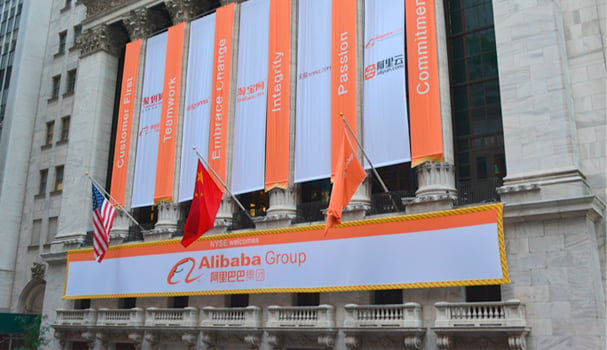Christopher Penler / Shutterstock.com
As the opening bell rang on the New York Stock Exchange (NYSE) on Friday, history was made. Alibaba, the Chinese e-commerce goliath, debuted its shares in the largest initial public offering (IPO) the world has ever seen. Alibaba – or BABA as it appears on the NASDAQ stock exchange – ended up being valued at $230bn (that’s a massive £141bn to you and me) following Friday’s IPO, eclipsing the likes of Facebook and Amazon, not to mention JP Morgan and eBay – and even edging very close to retail giant Walmart.
The 301.1 million shares initially went on offer at $68 each and rose momentarily to $99.70. The stock closed the first day of trading at $93.89, up 38%. The flotation ended up raising close to $29bn, dwarfing the previous U.S. record set in 2008 when Visa raised nearly $17.9bn. It came after Alibaba’s bankers exercised an option to release more shares in the company.
Alibaba is just one of many Chinese firms on the march and this IPO should serve as a wake-up call for Silicon Valley. Jack Ma, the eccentric mastermind behind the company, is now set to become China’s richest man. Not many surprises there, you might say. And in keeping with the theme of shattering records, demand for Alibaba was so high that trading did not begin for two hours after the opening bell as order imbalances took hold –making Friday the longest delay in NYSE history.
This was the only hiccup of the day, however, as Ma and his team took provisions to ensure that Alibaba didn’t encounter the same problems that plagued the Facebook IPO of 2010. The social media giant’s share prices slumped in the immediate aftermath of its IPO as the stock exchange failed to keep up with demand and investors expressed worries about the site’s mobile business.
“Speaking for Alibaba, we hope to become a global company, so after we go public in the US, we will expand strongly in Europe and America,” Wa told reporters in Hong Kong while meeting with global investors.
“At the same time we won’t abandon Asia, because after all we’re not a company from China, we are an Internet company that happens to be in China.” ![]()
Share via:








































